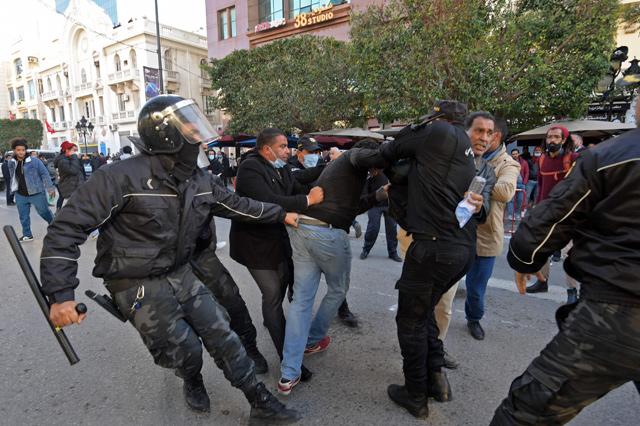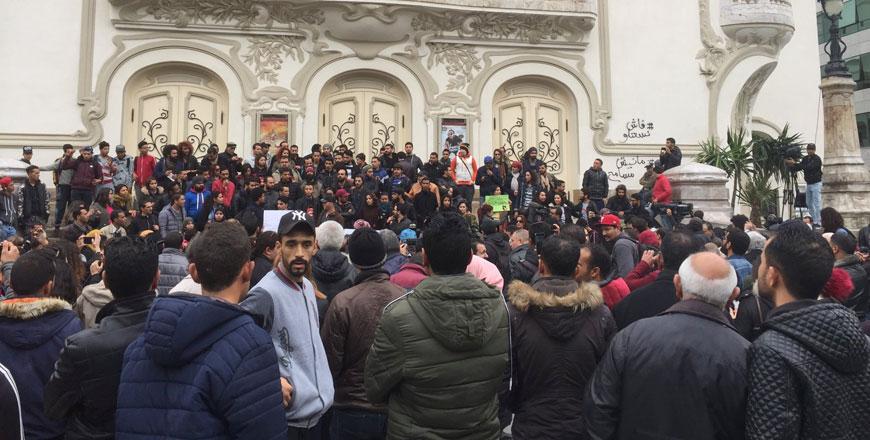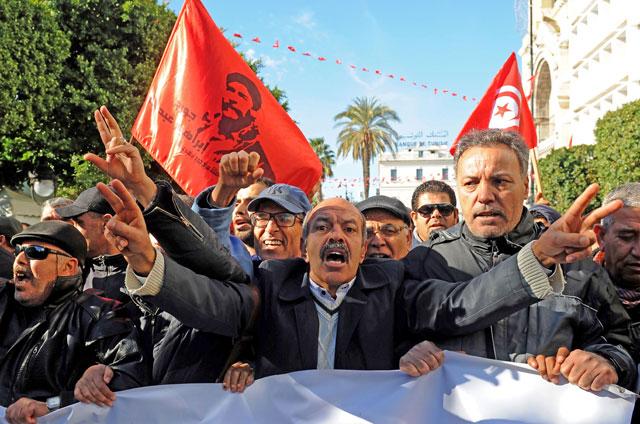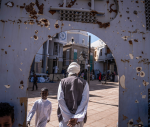You are here
Tunisia seeks to stem wave of nighttime street riots
By AFP - Jan 19,2021 - Last updated at Jan 19,2021

Tunisian security officers detain a protester during an anti-government demonstration on the Habib Bourguiba Avenue in the capital Tunis on Tuesday (AFP photo)
TUNIS — Tunisia braced for further protests on Tuesday after hundreds were arrested in four nights of street clashes between riot police and disaffected youths in cities across the north African country.
President Kais Saied urged young Tunisians to refrain from further violence even as social media posts called for new rallies.
“Do not attack or insult anyone and do not damage private property or state institutions,” he said on Monday, warning that “chaos” does not allow progress.
Rioting broke out Friday evening, and more than 600 people had been arrested by Monday over the disturbances in which young people have hurled rocks and Molotov cocktails at police who have fired teargas at them.
Much of the unrest has hit working class neighbourhoods, where anger is boiling over soaring unemployment and a political class accused of having failed to deliver good governance a decade on from the 2011 revolution.
The tourism-reliant economy shrank by 9 per cent last year, consumer prices have spiralled and one third of young people are unemployed.
Tunisia often sees protests in January, a month of several key anniversaries including longtime dictator Zine Al Abidine Ben Ali’s fall from power on January 14, 2011.
Large gatherings are banned due to the coronavirus pandemic and police have been deployed, with an overnight curfew extended from 8:00pm to 4:00pm.
‘Denial of the anger’
Tunisia’s divided political leadership has stayed largely silent on the protests by youths dismissed by many commentators as “delinquents”.
Messages posted online Tuesday called for protests to keep going, and activists warned that demonstrations were likely to continue until major action was taken to address the root cause of anger.
“There is a denial and an underestimation of the anger among young people,” said Olfa Lamloum, who heads the International Alert peace-building campaign group.
Tunisia’s 11 successive governments since the ouster of Ben Ali “have not had a strategy to answer the central question of employment”, she argued.
Lamloum, who works in some of the most deprived areas of the country, warned that “as long as there is a purely security response, with mass arrests, and no social or political response, tensions will remain high”.
The social unrest comes at a time of economic crisis, worsened by the impact of the COVID-19 pandemic, that has deepened poverty.
Widespread popular discontent is now driving many to leave.
Tunisians made up the largest number of irregular migrants, more than 12,000, who arrived in Italy last year on boats crossing the Mediterranean.
In the latest unrest, hundreds of youths in the capital Tunis battled police in several districts, including the vast Ettadhamen suburb.
In Sfax, the second largest city, protesters blockaded roads with burning tyres, an AFP correspondent reported. Clashes were also reported in the towns of Gafsa, Le Kef, Bizerte, Kasserine, Sousse and Monastir.
The powerful Tunisian trade union confederation UGTT has called for an end to the violence, while noting that the constitution guarantees the right to demonstrate.
Related Articles
TUNIS — Disillusioned with the outcome of the revolution they spearheaded, young Tunisians have become easy prey for jihadist recruiters in
TUNIS — A third night of unrest has shaken Tunisia where authorities said Thursday more than 600 people have been arrested this week as ange
TUNIS — Seven years since the Tunisian revolution that ignited the Arab Spring uprisings, 38-year-old Walid has no job and says people are e














